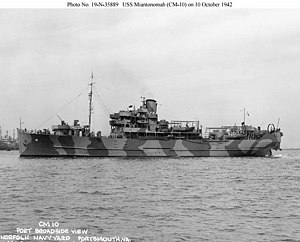USS Miantonomah (CMc-5)
 |
|
| History | |
|---|---|
| Name: | USS Miantonomah |
| Builder: | Pusey & Jones Corp., Wilmington, Delaware |
| Launched: | 1938, as SS Quaker |
| Acquired: | by the US Navy, 14 May 1941 |
| Commissioned: | 13 November 1941 |
| Renamed: | Miantonomah, 14 May 1941 |
| Reclassified: | CM-10, 15 May 1942 |
| Honors and awards: |
2 Battle Stars |
| Fate: | Sunk, 25 September 1944 |
| General characteristics | |
| Type: | Cargo ship / Auxiliary minelayer |
| Displacement: | 2,870 long tons (2,920 t) |
| Length: | 292 ft (89 m) |
| Beam: | 48 ft 7 in (14.81 m) |
| Draft: | 16 ft 6 in (5.03 m) |
| Speed: | 14 kn (16 mph; 26 km/h) |
| Complement: | 202 |
| Armament: | 2 × 4 in (100 mm) guns, 4 × machine guns, 1 × depth charge track |
USS Miantonomah (CM-10/CMc-5) was built as SS Quaker by Pusey & Jones Corp., Wilmington, Delaware, in 1938 and during the next three years operated along the eastern seaboard as a fast inland water passenger and freight carrier.
She was acquired by the United States Navy from her owner, Philadelphia & Norfolk Steamship Co., at Boston, Massachusetts on 5 May 1941; renamed Miantonomah on 14 May 1941; converted for U.S. Navy use as a coastal minelayer by Bethlehem Shipbuilding Co., East Boston, Massachusetts; and commissioned at Boston on 13 November 1941, Lieutenant Commander Raymond D. Edwards in command.
After completing conversion and following shakedown, Miantonomah steamed to the Virginia Capes where on 11 January 1942 she began laying her first minefield with Monadnock. Operating out of Yorktown, Virginia, she joined in the effort to reduce the German submarine menace along the east coast, and during the next several months sowed mines off Cape Hatteras and Key West, Florida. In addition, defensive mining operations sent her to the southern reaches of the Caribbean off Trinidad. Reclassified CM-10 on 15 May 1942, she continued duty with Mine Division 50 and in October completed preparations for oversea combat duty.
...
Wikipedia
